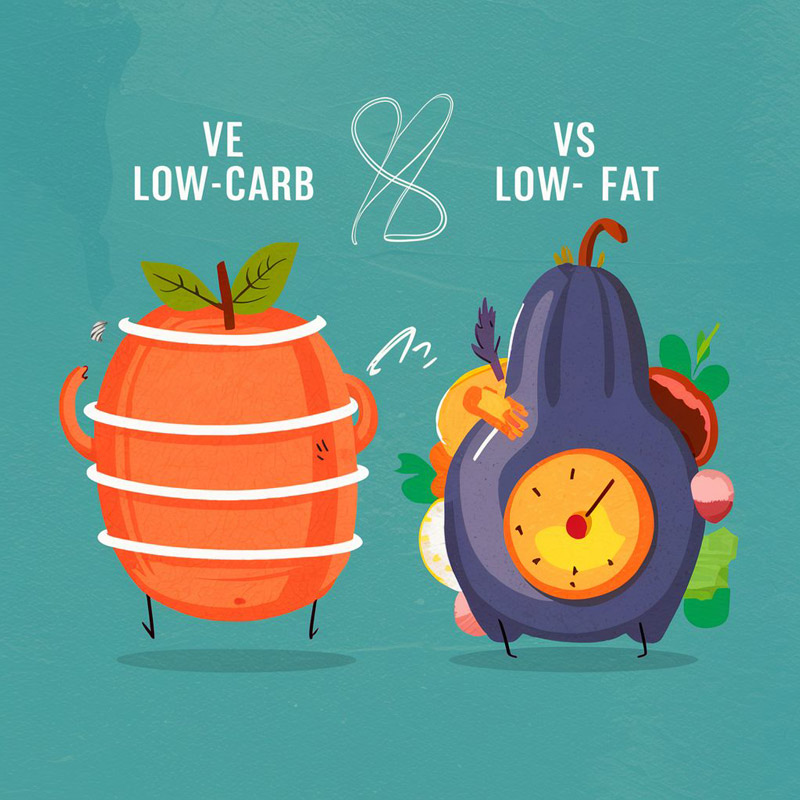The debate between low-carb and low-fat diets has been longstanding in the realm of weight loss. Both approaches boast dedicated followers, each touting their effectiveness in achieving weight loss goals. However, understanding the nuances of these dietary strategies is crucial for making informed choices tailored to individual needs and preferences.

Low-Carb Diet:
A low-carb diet restricts the intake of carbohydrates, emphasizing foods rich in protein and healthy fats. By minimizing carb consumption, this approach aims to regulate blood sugar levels, promote satiety, and ultimately, facilitate fat loss. The ketogenic diet represents an extreme form of low-carb eating, where carbohydrate intake is severely limited to induce a state of ketosis, wherein the body burns fat for fuel.
Proponents of low-carb diets argue that reducing carb intake leads to lower insulin levels, thereby promoting fat breakdown and weight loss. Additionally, advocates highlight the potential metabolic benefits, such as improved blood lipid profiles and better control over hunger and cravings.
Low-Fat Diet:
Conversely, a low-fat diet restricts the consumption of dietary fats, favoring carbohydrate-rich foods with minimal fat content. This approach gained popularity in the late 20th century following the belief that dietary fat, particularly saturated fat, was the primary culprit behind obesity and heart disease.
Low-fat diets typically emphasize whole grains, fruits, vegetables, and lean proteins while minimizing intake of fatty meats, oils, and high-fat dairy products. Proponents of low-fat eating argue that reducing fat intake reduces overall calorie consumption, making weight loss more achievable. Furthermore, they cite research suggesting that low-fat diets may improve cardiovascular health by lowering LDL cholesterol levels.
Comparing Effectiveness:
Numerous studies have attempted to compare the effectiveness of low-carb and low-fat diets for weight loss. Results vary depending on factors such as study duration, participant demographics, and adherence to dietary protocols.
Some research suggests that low-carb diets may lead to greater initial weight loss and improvements in certain metabolic markers, such as triglycerides and HDL cholesterol. However, long-term adherence to a low-carb lifestyle can be challenging for some individuals, particularly due to restrictions on carbohydrate-rich foods.
On the other hand, low-fat diets may offer advantages in terms of sustainability and adherence, as they often allow for a more diverse range of food choices. While initial weight loss may be slower compared to low-carb diets, some studies indicate that low-fat eating can still yield significant long-term results when coupled with healthy lifestyle habits.
Individual Considerations:
Ultimately, the effectiveness of a low-carb or low-fat diet hinges on individual factors such as metabolic health, dietary preferences, and lifestyle habits. Some individuals may thrive on a low-carb regimen, experiencing rapid weight loss and improved energy levels. In contrast, others may find greater success and satisfaction with a low-fat approach that emphasizes whole, minimally processed foods.
It’s essential to approach dietary choices with flexibility and an understanding of personal needs. Experimentation may be necessary to find the optimal balance that promotes both weight loss and overall well-being. Consulting with a healthcare professional or registered dietitian can provide personalized guidance and support in navigating the complexities of dietary decisions.
In conclusion, the debate between low-carb and low-fat diets underscores the diverse approaches to achieving weight loss. Rather than viewing these dietary strategies as mutually exclusive, individuals can leverage their unique benefits and tailor their eating habits to suit their individual goals and preferences. As with any dietary change, consistency, moderation, and sustainability are key to long-term success.
Disclaimer:
As a service to our readers, Viva Healthy Products Publishing provides access to our library of archived content. No content on this site, regardless of date, should ever be used as a substitute for direct medical advice from your doctor or other qualified clinician.